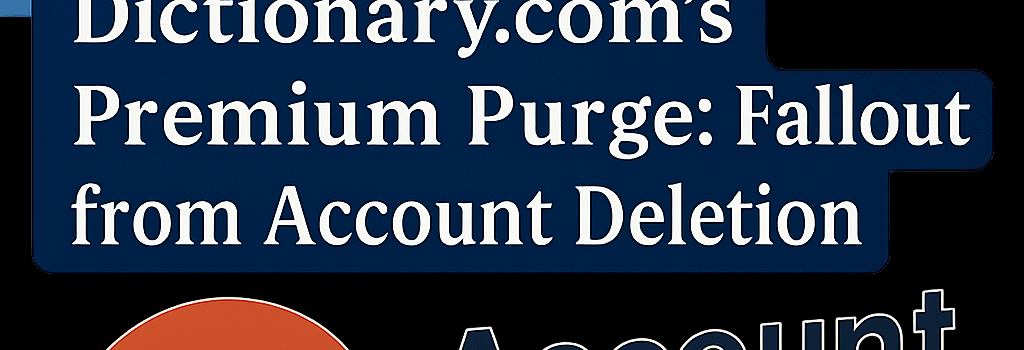Dictionary.com’s Premium Purge: Fallout from Account Deletion

The recent decision by IXL Learning to remove all premium accounts and saved word lists from Dictionary.com has sent shockwaves through the logophile community. Users who paid for ad-free experiences and advanced features found their data wiped overnight, sparking questions about technical choices, business strategies, and regulatory compliance.
Background of the Premium Model and Legacy Infrastructure
Prior to the update, Dictionary.com offered a paid mobile app known as ‘Dictionary.com Pro’ on Android and iOS. This version included:
- Offline dictionary downloads via one-time in-app purchases
- Ad-free browsing enabled by a subscription managed through Payment SDKs such as Google Play Billing and Apple StoreKit
- Additional content modules for science, rhyming dictionaries, and grammar tips
- Saved word lists and account synchronization via proprietary REST APIs
The legacy app backend relied on a Node.js microservices architecture running on AWS Lambda, with user data stored in Amazon DynamoDB tables. Word lists were serialized as JSON objects and cached in ElastiCache Redis to accelerate lookups.
Accounts Axed Abruptly and User Impact
Starting in May 2025, users began reporting login failures and missing features. By June 2025, Dictionary.com Pro was removed from the App Store and Google Play. Attempts to log in triggered an error:
We are sorry, but user accounts within the Dictionary.com app have been discontinued.
Support responses cited incompatible coding frameworks between the old and new app versions, preventing recovery of saved word lists. The new app, rebuilt in React Native and backed by a GraphQL API, no longer supported the legacy user schema.
Technical Underpinnings and Migration Challenges
Migrating from the legacy Node.js REST API to a unified GraphQL endpoint posed challenges. The original DynamoDB schema used composite keys to index user and vocabulary data, but the new GraphQL layer expects a relational data model on Amazon Aurora. Attempted data conversion scripts failed to reconcile nested JSON structures, leading to an irreversible data loss of saved lists.
Furthermore, the offline dictionaries were retrieved from AWS S3 buckets via pre-signed URLs embedded in the old app. The new build omits this functionality, forcing all lookups through the online API and increasing read throughput by 40 percent, as shown in IXL Learning performance reports.
Business Model Shift: Subscription vs Ad-Supported Strategies
Dictionary.com’s pivot reflects a broader trend among digital content platforms reducing one-time purchases in favor of ad-based revenue. According to RevenueCat’s 2024 report, fewer than 15 percent of educational apps earn over $1,000 per month from subscriptions. By reintroducing ads across all users, Dictionary.com aims to stabilize revenue through higher ad impressions and dynamic pricing models controlled by Google Ad Manager.
Industry analyst Marek Johnson of MediaMonitors notes: ‘Platforms are increasingly favoring programmatic ads over brittle subscription revenues. With RTB (real-time bidding) and header bidding, average CPMs can outpace ARPU from niche pro subscriptions.’
Data Portability, Regulatory Implications, and Best Practices
Under GDPR and CCPA, users have the right to export personal data. Saved word lists could be considered user-generated content, and forcing deletion without backup options risks non-compliance. Privacy attorney Laura Chen explains: ‘Data controllers must provide a mechanism for data export before discontinuing services. Failure to do so may lead to regulatory fines.’
Best practices recommend implementing a user-driven export feature via secure APIs, storing backups in encrypted S3 buckets with versioning enabled, and updating terms of service to reflect data lifecycle policies.
User Reaction and Community Backlash
Online communities on Reddit and Change.org have expressed outrage. A petition led by Daniel Ramirez garnered over 10,000 signatures demanding advanced notice and data recovery. Android and iOS app reviews plummeted to an average rating of 1.2 stars.
Lessons Learned and Recommendations
- Maintain backward compatibility or provide migration tools when rearchitecting backends
- Offer clear advance notice and data export options for premium users
- Document feature deprecations in release notes and support pages
- Consider hybrid ad-supported plus subscription tiers to balance recurring revenue with user satisfaction
Outlook and Next Steps
As of early August 2025, IXL Learning has initiated an internal audit to assess data recovery possibilities and is reportedly exploring a standalone word-export utility. Meanwhile, competitors like Merriam-Webster and emerging AI-powered definitions in ChatGPT plugins continue to attract users seeking reliable, exportable vocabulary tools.